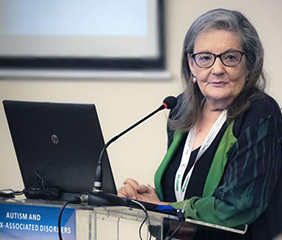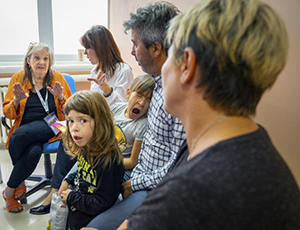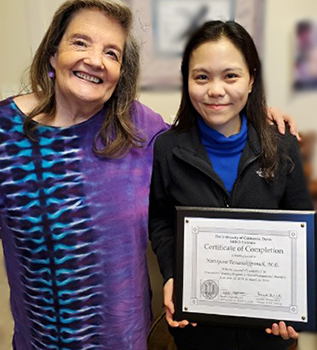Fragile X research icon empowers hundreds of women as a dedicated mentor
Pediatrician Randi Hagerman mentors physicians, students and providers worldwide, increasing understanding of rare genetic disorder
If mentoring is a lot like gardening — where seeding, nurturing and growth are crucial for success — then Randi Hagerman, medical director of the UC Davis MIND Institute, has one heck of a green thumb.

The pediatrician has mentored hundreds of people over her decades-long career, most of them women.
“I think it’s really important to encourage women in medicine,” said Hagerman, an internationally recognized expert on the genetic condition fragile X syndrome and director of the Fragile X Research and Treatment Center at the MIND Institute. Medicine is a great career for women “because of their innate, nurturing temperament,” Hagerman said. “You know, she added, chuckling knowingly, “women are the majority of the MIND Institute faculty.”
Hagerman is vibrant and outgoing, with a ready smile and energy to spare. She jokes that after 40 years in medicine – 20 of them at the MIND Institute – she’s now a “geriatric pediatrician.” But don’t be fooled; she’s a force to be reckoned with.
Fragile X syndrome (FXS) is the most common inherited cause of intellectual disability. Its characteristics range from mild emotional, sensory or learning problems to severe intellectual disabilities and autism. Hagerman and her UC Davis physician-scientist husband Paul Hagerman discovered the related genetic condition fragile X-associated tremor/ataxia syndrome (FXTAS) nearly 20 years ago, and patients travel from all over the globe to see Hagerman. She’s an icon in the fragile X world.
“Dr. Hagerman is an incredible physician,” said Nicole Tartaglia, pediatrician and director of the Denver Fragile X Clinic at the University of Colorado. “Her patients love her. Her passion in conjunction with her exceptional clinical skills — and love of her patients — inspired my career.”
Hagerman mentored Tartaglia when she was a medical student, then as a fellow and now as a faculty mentor in research. She said Hagerman has provided valuable advice on “navigating the complexities of life as a mom, wife, clinician and researcher.”

Randi Hagerman meets with a family about their son’s fragile X during a trip to Serbia to help patients and train medical providers
Tartaglia would probably be a child neurologist today if Hagerman hadn’t introduced her to developmental pediatrics and helped her to raise funds for research. “As a mentor, she is always positive, but provides guidance, support and career-building opportunities and networking,” Tartaglia said.
Hagerman mentors people worldwide. About five years ago, she and the MIND Institute’s Robert Miller started the International Training Program for Neurodevelopmental Disorders (ITPND), which has welcomed physicians from many countries, including China, Thailand, Indonesia, Mexico, Europe, Italy, Spain, Turkey and others to train for three to 12 months at a time. She’s currently working to bring a Nigerian pediatrician to the program and will be covering some program costs herself.
“This education, what we know at the MIND Institute, is so very important to get out to the world,” said Hagerman. “We are changing lives — we’ve helped thousands and thousands of people.”
She also likes to travel, leading fragile X screening efforts in Mexico, Colombia, Serbia, Guatemala and Iran among other places.
Everywhere she goes, she teaches.
“I don’t care where they come from, or what their level of expertise is. I love to mentor people, whether they’re medical students, residents, fellows, staff, or anyone who can make good use of the training and knowledge.”
— Randi Hagerman
She works with physician networks everywhere, encouraging screening and offering guidance in communities where people have often never heard of fragile X. An estimated 300 million people worldwide have a neurodevelopmental disability, but only a small percentage of health care professionals are familiar with the conditions.
“I always tell people I mentor, that as you learn how to treat and help patients, be sure to write a paper or a book about your knowledge, because that impacts not only the person you’re seeing at the moment, but thousands of other people.”
She’s seen this herself, perhaps most memorably when she was in Brazil, attending a fragile X conference. “A woman came up to me with this book I’d written about the treatment of fragile X and she could barely speak English, but she said to me, ‘this has made all the difference in the world to me,’ and I thought, ‘wow, she’s coming out of the jungle of Brazil and she’s read my book?’” Hagerman was floored.
“My book impacted people all over the world — people that I’ll never meet, that I’ll never interact with, and that’s why I encourage young trainees to get involved in research because your outreach is so much more dramatic,” said Hagerman.

Randi Hagerman and Nattaporn Tassanakijpanich, a 2019 ITPND trainee from Thailand
The advice made an impression on Nattaporn Tassanakijpanich, a pediatrician from Thailand who was an ITPND trainee under Hagerman for nine months in 2019. “Dr. Hagerman was the best mentor I’ve ever had,” she said. “She empowers me to do research studies, as she told me, ‘One doctor can treat one patient at a time, but research can treat patients all over the world.’”
Hagerman also encourages women who are interested in medicine not to be dissuaded by the challenge of work-life balance.
“I was the first resident in pediatrics who had a baby during my residency at Stanford, and I don’t think the department chair ever forgave me,” she laughed. She went back to work after two weeks, her daughter in tow, and breastfed her during rounds.
In a piece of beautiful symmetry, that same daughter, when she turned 30, was in her second year of residency at UCLA. “I told her that she’d already done that residency, half in utero and half after she was born, so it should be a piece of cake” Hagerman said with a smile.
Related stories:
https://www.ucdavis.edu/health/news/spreading-healing-and-hope



